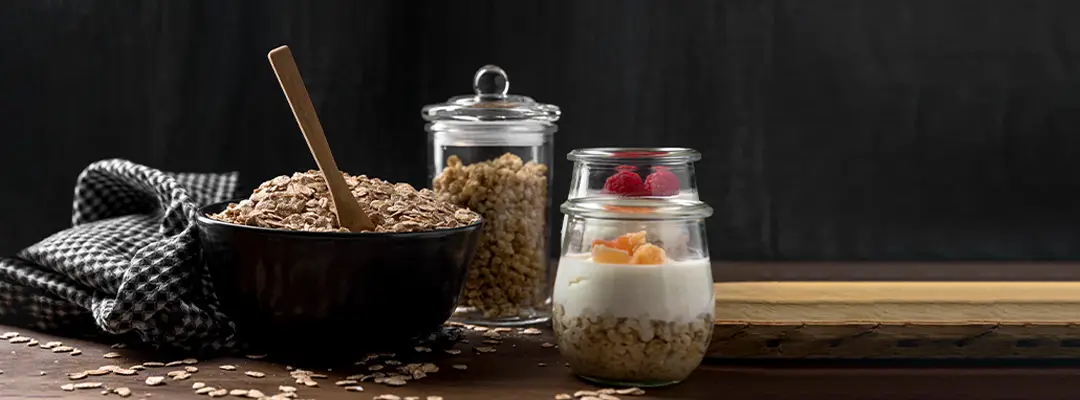YUMMY VALLEY’S SALE 🎁
Upto 20% Off
Get 1 Free Millet Bite Pack With Every Order
- Your cart is empty
- Continue Shopping
MILLET: The Super Crop & Its Benefits
- Published on:
- Last update: 13 November 2023
- This post has just been created. Stay tuned for updates and additional content.

What Are Millets?
Millet is a type of cereal that is a part of the grass family Poaceae. This small round whole grain is grown in India and Nigeria, especially in Asia and Africa. Just like brown rice and quinoa, millet food can be cooked for easy digestion.
Table of Contents
ToggleThere are multiple types of millets. However, the most common varieties include Finger Millet, Foxtail Millet, Pearl Millet, Proso Millet, Little Millet and Sorghum Millet. Millet is loaded with nutritional value and that is why many dieticians and doctors recommend it as one of the breakfast cereal that you must include in your diet. Additionally, millet muesli is also recommended by diet consultant experts because it is a more nutrient dense type of millets.
Types of Millets
There are several millets types that you can find. Some of these are mentioned herein below:
- Sorghum Millet (Jowar)
It is commonly called Jowar in India. The largest sorghum-producing states in India are Maharashtra and Karnataka. Some varieties of Sorghum are used for ethanol production.
- Proso Millet (Chena / Barri)
Also called broom-corn millet, this grain is mostly found in the drier regions of Asia, Australia, Africa, Europe, and North America. You do not need a lot of water to grow this crop.
- Pearl Millet (Bajra)
In India, you will find this crop by the name Bajra and is mostly grown in states such as Gujarat, Rajasthan, Maharashtra, Uttar Pradesh, and Haryana.
- Foxtail Millet (Kakum / Kangni)
Foxtail millet or Italian millet is usually grown in a semi-arid region. The growing season of this type of millet in India is abridged.
- Finger Millet (Ragi)
The common name for finger millet in India is ragi. The ragi millet is popular for its nutritional benefits. It is one of the high-grown millets in India and ragi flakes are mostly used in baby foods.
- Browntop Millet (Korle)
This millet is mostly grown in Karnataka and Andhra Pradesh. What makes this millet unique is that it can be grown even in less fertile soil.
- Barnyard Millet (Sanwa)
This is one of the millets in India that is grown in certain parts of Andhra Pradesh and Uttarakhand. Its specialty is that it grows even in marginal lands.
- Little Millet (Moraiyo)
Whether there is water logging or drought, this millet can be easily grown. This type of millet is usually found in the Eastern Ghats in India.
- Buckwheat Millet (Kuttu)
Buckwheat is one of the most popular varieties of millet, it is also known as kuttu in India and is frequently consumed during the Navratri fasting period. It lowers blood pressure and is diabetic-friendly. It is beneficial for cardiovascular health, and you should include it in your diet if you wish to lose weight. Additionally, buckwheat safeguards against gallstones, asthma in children, and breast cancer.
- Amaranth Millet (Rajgira)
Amarnath, also known as Rajgira, is a great source of protein and dietary fiber. It is excellent for a balanced diet. Additionally, this millet aids in preventing hair loss and greying. Amaranth also reduces cholesterol and the chance of developing cardiovascular disease. It contains a lot of calcium, vitamins, and other nutrients.
- Kodo Millet
Kodo millet is a digestible kind of millet that contains more of the amino acid lecithin. It helps to strengthen the neurological system. Niacin, B6, and folic acid, among other B vitamins and other vitamins and minerals, are especially abundant in kodo. It has minerals such as calcium, iron, potassium, magnesium, and zinc. It is excellent for people who are gluten intolerant because it is a gluten-free millet. When used consistently by postmenopausal women, it can treat cardiovascular problems like excessive blood pressure and cholesterol levels.
Health Benefits of Millets

According to some research, there are heaps of millet benefits to the human body. Let’s discuss a few of them.
- Contributes To Digestive Health
Consuming millet cereal can help in regulating bowel movement since it contains fiber very much like rolled oats. It also contains prebiotics which help in the growth of probiotics in the microbiome. This helps in improving gut health and immunity.
- Great For People With Gluten Intolerance
People who cannot tolerate gluten in their food can consume millet without any doubt since it is gluten-free cereal. That is why many types of gluten-free oats contain millet.
- Supports Heart Health
Magnesium is one of the nutrients which improve the cardiovascular system, and millet contains magnesium. As an individual consumes millet, the grain will help in improving the level of protein adiponectin, which ultimately helps in protecting cardiovascular tissues.
- Enhances Mood
One of the millet benefits is that it has a high concentration of the amino acid, tryptophan, which helps in improving mood. People who are suffering from anxiety or depression must consume millet in their daily diet.
- Manages Weight
People who have been struggling with the problem of obesity or being overweight should consider including millet in their diet.
Millets For Babies

Millet is a nutritious grain that is safe for infants as well. It can make for a healthy, wholesome meal that is easily digestible, gluten-free, and versatile. The benefits of millet for babies are numerous as it is rich in iron, minerals, calcium, and more, aiding in the healthy and steady growth of the baby. Millet is a good protein source and is rich in multiple vitamins, phosphorus, potassium, iron, and magnesium. Finger millet has a higher micronutrient deficiency than rice and wheat. So, it makes for an excellent weaning food choice for babies
Tips: Soaking, germination, and fermentation of millets can improve iron bioavailability of millets which can help babies get sufficient iron.
Millets For Women

Millets are rich in vitamins, protein, antioxidants, and minerals like magnesium, iron, copper & zinc which makes them hormone-friendly grains. When protein and carbohydrates are balanced, the chances of insulin resistance are reduced, which is necessary for managing PCOS.
High Fibre in millets helps in estrogen metabolism.PCOS women face heavy bleeding, which leads to a loss of iron. Millet is a good source of iron, zinc, magnesium, calcium, and potassium.
Weight loss is the top priority for PCOS women, and millets are excellent for weight loss, as they are nutrient-dense and low in calories and GI.
Millets that are best for PCOS are Ragi, Jowar & Bajra, and foxtail. These are PCOS-friendly millets and help in controlling cholesterol and blood sugar levels. They are naturally gluten-free which is advisable for PCOS.
Why Millets are Good for Pregnant Women
Calcium and folate help in fetus development. Magnesium and potassium manage blood pressure.
For those who are trying to conceive – this grain can help you. The science behind this is that grains that are high in complex carbs and low in refined carbs prevent a surge in insulin resistance and preserve ovulation.
It’s significant in Vitamin b like niacin, folate, and pantothenic acid. Such nutrients aid in the results of several enzyme reactions in our bodies as well as being needed for functional status.
Millet includes probiotic bacteria, which are insoluble fibers. It encourages the development of advantageous bacteria in the intestines. Insoluble fiber soothes signs such as incontinence, bloating, gas, and cramps, among many others.
If you want to keep your heart healthy, it is a healthy and nutritious grain to add to your nutrition.
It has a high magnesium content, which assists in controlling blood pressure. Millets are also full of fiber (both insoluble and soluble fiber). As a result, it is an excellent option for people with high levels of cholesterol. It is less in simple carbs and strong in complex carbohydrates, causing it a low Glycemic index meal that tends to help regulate glucose levels and assist in losing weight which makes it good for diabetic people as well. Millets contain a significant amount of antioxidant properties and phenolic compounds, particularly catechins and ferulic acid. Antioxidant properties aid in reducing the body’s oxidative stress and stimulate immune features. Darker millets have greater antioxidant levels than lighter millets.
Barnyard Millet’s health benefits for enhancing immune function are evident as it is packed with iron and zinc. Both are advantageous to the body’s opposition to foreign object threats or illness. If you wish to strengthen your immune system, look for vegetables and fruits high in iron and zinc like barnyard millet. Barnyard Millet is a fiber-rich meal that encourages intestinal mobility and ends up wasting expulsion by enhancing the density of stools. Barnyard millet includes both insoluble and soluble fiber. The fiber content perks a person’s intestinal health by enhancing the efflux of food or solid waste. Grains are full of fiber and thus helpful to gut health.
Note: Women should avoid taking kodo millet and karuppu kavuni rice during pregnancy since it tends to dehydrate the body and generate heat.
Millets For Cancer Patients
While recovering from cancer, nutrition and a diet filled with fiber play an important role. Millets
are rich in magnesium, fiber, phosphorus, niacin, serotonin, and zinc and are 100% gluten-free creating a calming effect on your mood. Being alkaline in nature, it is recommended to include Bajra and Jowar in the diet of Cancer Patients as they increase the possibilities of healing from cancer dramatically. These high-fiber flakes are easily digestible & help in reducing acidity, and constipation.
How To Eat Millets Regularly?

If you want to add millet to your diet regularly, the following tips can be helpful for you.
Take some porridge made out of any millet and add some fresh berries to it. You can also add frozen berries if fresh berries are not available.
You can make stews or soups out of millet and also you can use millet for your salads.
Millet Muesli is also a great option as a meal and an anytime snack whenever there are hunger pangs.
Now, all that you must do is buy the best quality millet and start adding it to your meals.

